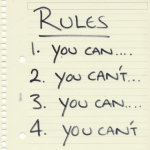I make the bulk of my living as a corporate copywriter and freelancer. That means I spend a lot of time writing spam and junk mail.
Oh, I could tell you I write “marketing collateral” or I “develop B 2B and B2C messaging campaigns” but unless you’re actually in marketing and advertising, that’s probably not going to mean much to you. But when I say, “spam” and “junk mail” general folks I bump into on the street instantly know what I’m talking about. We have a baseline. I can refine from there.
I was thinking about the ways people talk recently when I received some feedback about one of my projects. Someone pointed out that the grammar of the subject line in an email I wrote was incorrect.
The original was something along the lines of: “Found who you’re looking for?”
As most copyeditor folks and even some high falutin’ writers will tell you, that sentence commits a number of sins. If that sentence were written in a grammatically correct way, it would read: “Have you found the person for whom you are looking?”
Catchy, isn’t it? Obviously, I should have used that one.
Right?
“Have you found the person for whom you are looking?” may be grammatically correct, but it fails to do what I need it to do. As an email subject line, it’s too long. It also sounds awkward and off-putting, distancing. It uses a “high” narrative language that implies I’m speaking down to somebody, and that’s not my intent – I want to speak in a simple, relatable way.
Yes, I thought about this.
Writing the way people talk, in a way they’ll find accessible, is as much a writing skill as “knowing the rules.” I make the same sorts of tough choices in my fiction writing, too. My characters use references pertinent to their world and worldview, education and training. Having a good ear for the way people talk – without being a literal transcriptionist (cause whoa boy nobody would understand a thing) is a great skill for a writer.
Most people don’t speak in a grammatically correct way. In fact, when we hear grammatically correct stuff like, “Discover the teacher for whom you are looking,” it sounds a little funny. That’s because it often doesn’t gel with our internal grammar. Our internal grammarian is always going to be a jump ahead of the printed “rules.”
How many words do you use every day that aren’t even in the dictionary? How many times have you used the word “whom” this week? I spend a lot of time thinking about the audience I’m writing for, and how those folks are used to communicating with people. Again, this pertains to fiction, too. There’s a reason that there are more people reading simply-written books with solid but simple stories than purple-prose doorstoppers.
That’s not to say I’m against lovely language – I prefer weird, gorgeous language, myself- but my fiction audiences and my freelancing/corporate audiences are very different, and I write differently for each.
When writers tell you to “learn all the rules… and then break them,” grammar is one of those rules. You should know what you’re supposed to say, sure – because then you can make a conscious choice to actually say what you mean in a way your audience will understand.


